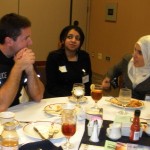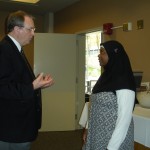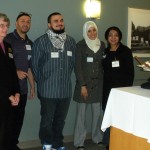 Widad Boussaha, a Muslim engineering student from Algeria, hopes the Muslim Student Association will help change the way students at Sinclair Community College see Islam.
Widad Boussaha, a Muslim engineering student from Algeria, hopes the Muslim Student Association will help change the way students at Sinclair Community College see Islam.
“We want to show the meaning of Islam because many, many people felt that Islam is just terrorists,” she said. “We want people to know the true Islam is peace. This is the first meaning of Islam.”
……
The Muslim Student Association
The MSA is an organization of faculty, staff and students who happen to be Muslim, according to Assistant Professor Abdullah Johnson, who serves as the club’s advisor.
“We’re not there trying to make anybody Muslim,” he said.
Johnson said the club is a place for Muslims and non-Muslims to come together, ask questions about Islam and learn from each other. He encourages teachers who are covering Islam in their classes to invite members of the club to discuss Islam with their students. The club also does community service together at sites such as the House of Bread, according to member Ramon Mejia.
Johnson said club members sometimes face discrimination because of their faith, and he encourages them to respond to discrimination with patience.
“You have to stand firm in your faith. You have to be patient,” Johnson said. “Why get caught up on why people don’t like you?”
Reversion to Islam
Mejia, who was raised as a Catholic, thought Islam was a religion of hate before he was deployed to Iraq in 2003. After hearing the Islamic call to prayer in Baghdad, Mejia became curious about the religion and studied it for the next five years. He chose to revert to Islam on Aug. 29, 2008.
“In Islam one does not simply convert, but one truly reverts to what one should have been all along,” Mejia said.
Mejia is not the only person in the MSA that has reverted to Islam. Johnson was a Christian minister before his reversion in 1996. He said the change seemed like a natural fit for him.
“Islam is a simple religion,” Johnson said. “Other people make it difficult.”
Wearing the hijab
 Boussaha said she was born a Muslim. She chooses to wear a hijab, or scarf, to cover her head. She said she has faced discrimination from people who don’t know her because of her choice to wear the head covering.
Boussaha said she was born a Muslim. She chooses to wear a hijab, or scarf, to cover her head. She said she has faced discrimination from people who don’t know her because of her choice to wear the head covering.
“When I came here the first time, people that don’t know me, they start (to) look at me like I’m mean or I’m bad in my work, here, everywhere,” Boussaha said. “But with time, they know that I’m not a bad person. I don’t hurt people; I just try to help people. From this point they start to understand me more and more.”
Fatima Idmahand, a Nursing student, is also a Muslim woman, but she chooses not to wear a hijab. She said because of her choice, many people mistake her for an American even though she was born in Morocco.
“If I was wearing a scarf like her (Boussaha), they would think I’m not from here, and they (would) know I’m Muslim,” Idmahand said. “But they don’t know that the first time (we meet) because I don’t wear the hijab.”
Diversity on campus
 Johnson thinks students need to be open-minded about diversity and remember that there are many cultures and lifestyles around them.
Johnson thinks students need to be open-minded about diversity and remember that there are many cultures and lifestyles around them.
“As you mature and learn about different cultures and different religions, you learn they all have the same problems,” Johnson said.
Boussaha wants students to identify Islam with its message of peace, not with the violence associated with terrorism.
“I want to say that everywhere there are good and bad (people) like here in the United States…I want to say that (they are) everywhere, not just Muslim people, not just the Middle East,” she said. “We can’t judge one person from 9/11 to all people.”
